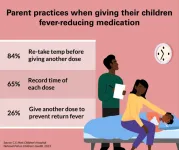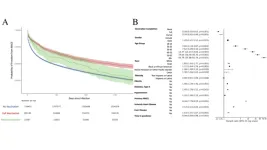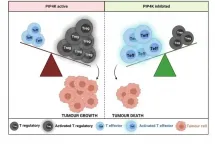(Press-News.org) For many children, winter season comes with regular exposure to circulating viruses at school or daycare. And a warm forehead is often one of the first clear signs a child has caught a bug.
But some parents may not be properly measuring or responding to elevated temperatures in children, a new national poll suggests.
While most parents recognize that a low-grade fever helps a child’s body fight off infection, one in three would give fever-reducing medication for spiked temperatures below 100.4 – which isn’t recommended – according to the C.S. Mott Children’s Hospital National Poll on Children’s Health at University of Michigan Health.
Half of parents would also use medicine if the fever was between 100.4 and 101.9 degrees, and a quarter of parents would likely give another dose to prevent the fever from returning.
“Often parents worry about their child having a fever and want to do all they can to reduce their temperature. However, they may not be aware that in general the main reason to treat a fever is just to keep their child comfortable,” said Mott Poll co-director and Mott pediatrician Susan Woolford, M.D.
“Some parents may immediately rush to give their kids medicine but it’s often better to let the fever runs its course. Lowering a child’s temperature doesn’t typically help cure their illness any faster. In fact, a low-grade fever helps fight off the infection. There’s also the risk of giving too much medication when it's not needed, which can have side effects.”
The report is based on 1,376 responses from parents of children ages 12 and under polled between August and September 2022.
Two in three parents polled say they’re very confident they know whether their child needs medication to reduce a fever. But just over half are sure they understand how temperature readings can change according to the method used.
The method used to take a child’s temperature matters and can affect the accuracy of the measurement, Woolford notes. Parents polled most commonly take their child’s temperature by forehead scan or mouth while less than a sixth use ear, underarm or rectal methods.
Remote thermometers at the forehead or inside the ear canal can be accurate if used correctly. But forehead readings may be inaccurate, Woolford says, if the scanner is held too far away or if the child’s forehead is sweaty. With ear thermometers, which aren’t recommended for newborns, earwax can also interfere with the reading.
For infants and young children, rectal temperatures are most accurate. Once children are able to hold a thermometer in their closed mouth, oral temperatures also are accurate while armpit temperatures are the least accurate method.
“Contact thermometers use electronic heat sensors to record body temperature but temperatures may fluctuate depending on how it’s measured,” Woolford said.
“Regardless of the device used, it’s important that parents review the directions to ensure the method is appropriate for the child’s age and that the device is placed correctly when measuring temperature.”
Three in four parents say they take their child’s temperature as soon as they notice a possible problem, while a little less than a fourth wait to see if the problem continues or worsens before taking the temperature.
Two-thirds of parents also prefer to try methods like a cool washcloth before using fever-reducing medication. Most parents also say they always or usually record the time of each dose and re-take their child’s temperature before giving another dose.
“A quarter of parents would give their child more medicine to prevent a fever from returning even though it doesn’t help them get better,” Woolford said. “If a child is otherwise doing well, parents may consider monitoring them and using alternative interventions to help keep them comfortable.”
However, if a newborn or infant less than three months old has a fever, they should immediately see a health professional, Woolford adds.
She shares more tips on how to handle fevers in kids:
Fevers can help fight infections
A fever can be beneficial, and there are several reasons to let a low-grade fever run its course in older children – mainly because it’s working as a weapon to kill the virus or bacteria causing sickness, Woolford says.
Evidence shows that fevers are part of the immune response to prevent viruses and bacteria from replicating and also produce more white blood cells and antibodies.
Fever-reducing medications also mask symptoms.
“Medications used to lower temperatures also treat pain, but pain is often a sign that helps to locate the source of an infection,” Woolford said. “By masking pain, fever-reducing medication may delay a diagnosis being made and delay receiving treatment if needed.”
She adds that parents may also be tempted to take kids in public when they noticeably seem better after medicine when in fact they’re still highly contagious and may infect others.
If you do use medicine, be careful about not overmedicating
When parents choose to give fever-reducing medication, it’s helpful to keep a log of temperature readings and when medicine was given. This will provide an accurate record in the event that the child’s fever continues for an extended period of time.
Parents of young children in particular should also avoid using combination cold medications along with fever-reducing medications due to the risk of over dosage.
“As we know, all medications can have side effects and we really don't want children to get too much medication when it's not necessary,” Woolford said.
When communicating with the child’s provider to help determine the best recommendations about treatment, it’s helpful for parents to share the timeline of the child’s fever, doses of fever-reducing medication, other symptoms and how the child is acting compared to their “usual” behavior.
Try alternatives to relieving child’s discomfort
Parents may consider other interventions to relieve discomfort and aid in more restful sleep instead of medicine, Woolford says.
Such approaches could include keeping their room cool and not letting them overexert themselves, as well as ensuring the child is in light clothing and encouraging them to stay well hydrated with fluids or popsicles.
Be aware of signs to call the doctor
For infants and newborns three months and younger, any sign of a fever should prompt a call to the provider.
For children 4-12 months, parents should consult with a doctor if a fever is accompanied by signs such as decreased activity, increased fussiness, or decreased urine output. Parents should also call if their child has signs of pain or if they are not acting themselves even when their temperature comes down.
Fevers that reach 104 degrees or fevers that remain for an extended period (more than 24 hours for children under two, or more than three days for children ages two and older) should prompt contact with the provider.
END
1 in 3 parents may unnecessarily give children fever-reducing medicine
Some parents may reach for medication too quickly when children feel warm, new national poll suggests.
2023-02-20
ELSE PRESS RELEASES FROM THIS DATE:
Correspondence shows troubling interactions between US officials and the alcohol industry
2023-02-20
Correspondence shows troubling interactions between U.S. officials and the alcohol industry
By Kimberly Flynn
PISCATAWAY, NJ — Growing evidence exists that the alcohol industry uses a variety of strategies to influence public policy in a way that is advantageous to its own corporate interests, rather than the interest of public health. Recent communication between employees of the National Institute on Alcohol Abuse and Alcoholism (NIAAA) and alcohol industry groups shows extensive interaction on policy-relevant scientific issues, according to a new study in the Journal of Studies on Alcohol and Drugs.
Researchers at the University ...
COVID-19 vaccination linked to fewer cardiac events
2023-02-20
New York, NY [February 20, 2023] – Analyzing the most extensive datasets in the United States, researchers from the Icahn School of Medicine at Mount Sinai have revealed that vaccination against COVID-19 is associated with fewer heart attacks, strokes, and other cardiovascular issues among people who were infected with SARS-CoV-2, the virus that causes COVID-19.
The research letter, “Impact of Vaccination on Major Adverse Cardiovascular Events in Patients with COVID-19 Infection,” was published in the Journal of the American College ...
Pathways of memory: anthropological poetry at SAPIENS magazine
2023-02-20
Contact: Chip Colwell
chip@sapiens.org
212.683.5000
New York, NY – SAPIENS magazine is excited to share news of its 2023 poet-in-residence: Toiba Naseema. Through this position, Naseema will use poetry, film, and music to reflect on memory, occupation, and resilience in Indian-occupied Kashmir.
Naseema earned a master’s degree in mass communication, specializing in documentary filmmaking, and she is currently pursuing a master’s in anthropology at the University of Kashmir. She has been involved as an international ...
No safety concerns seen with use of dapivirine vaginal ring during third trimester of pregnancy, according to interim results of DELIVER study
2023-02-20
A vaginal ring containing the antiretroviral drug dapivirine posed no safety concerns when used in the third trimester of pregnancy, according to results to date from the first study of the dapivirine ring during pregnancy and one of only a few studies of an HIV prevention product in pregnant cisgender women.
The ongoing Phase IIIb study, known as DELIVER, or MTN-042, was designed to evaluate the safety and acceptability of the monthly dapivirine vaginal ring, a new HIV prevention method approved in several African countries and recommended by the World Health Organization (WHO), as well as ...
Doxycycline does not prevent STIs among cisgender women
2023-02-20
February 20, 2023 – Researchers from the University of Washington (UW), Kenya Medical Research Institute (KEMRI), and Hennepin Healthcare Research Institute (HHRI) announced results at CROI from a clinical trial demonstrating that doxycycline taken after sex does not prevent bacterial sexually transmitted infections (STIs) – chlamydia or gonorrhea – among cisgender women. The dPEP Kenya Trial was conducted in Kisumu, Kenya, to evaluate the effectiveness of doxycycline postexposure prophylaxis (PEP) to prevent bacterial STIs. The results of the study have been highly anticipated, as this is the first study of doxycycline PEP among cisgender ...
Geckos know their own odor
2023-02-20
Geckos can use their tongue to differentiate their own odor from that of other members of their species, as researchers from the University of Bern have shown in a new experimental study. The findings show that geckos are able to communicate socially, meaning that they are more intelligent than was previously assumed.
Self-recognition is the ability to detect stimuli which come from oneself. We as people, and also some animals, can identify ourselves visually when we look in the mirror. However, not all animals rely on their sense of sight, first and foremost. Geckos, and also other lizards ...
Scientists model 'true prevalence' of COVID-19 throughout pandemic
2021-07-26
Government officials and policymakers have tried to use numbers to grasp COVID-19's impact. Figures like the number of hospitalizations or deaths reflect part of this burden. Each datapoint tells only part of the story. But no one figure describes the true pervasiveness of the novel coronavirus by revealing the number of people actually infected at a given time -- an important figure to help scientists understand if herd immunity can be reached, even with vaccinations.
Now, two University of Washington scientists have developed a statistical framework that incorporates key COVID-19 data -- such as case counts and deaths due to COVID-19 -- to model the true prevalence of this disease in the United States and individual states. Their approach, published the ...
New breakthrough to help immune systems in the fight against cancer
2021-07-26
New research has identified potential treatment that could improve the human immune system's ability to search out and destroy cancer cells within the body. Scientists have identified a way to restrict the activity of a group of cells which regulate the immune system, which in turn can unleash other immune cells to attack tumours in cancer patients.
"A patient's immune system is more than able to detect and remove cancer cells and immunotherapy has recently emerged as a novel therapy for many different types of cancers." Explained Nullin Divecha, Professor of Cell Signalling at the University of Southampton who led the study. "However, cancer cells can generate a microenvironment ...
Through the thin-film glass, researchers spot a new liquid phase
2021-07-26
Research published in the Proceedings of the National Academy of Sciences describes a new type of liquid in thin films, which forms a high-density glass. Results generated in this study, conducted by researchers in Penn's Department of Chemistry, demonstrate how these glasses and other similar materials can be fabricated to be denser and more stable, providing a framework for developing new applications and devices through better design.
Glass is typically created through solidification, or falling out of equilibrium, of a liquid when it is cooled to a temperature where its motion arrests. The structure of a glass closely ...
Administering opioids to pregnant mice alters behavior and gene expression in offspring
2021-07-26
Mice exposed to the opioid oxycodone before birth experience permanent changes in behavior and gene expression. The new research published in eNeuro highlights a need to develop safer types of painkillers for pregnant women.
Opioids like oxycodone are prescribed to pregnant women to treat pain, but the drugs may affect the fetus, too. Opioids can pass through the placenta, binding to receptors in the fetal brain, which can lead to opioid withdrawal in newborn babies. The long-term consequences of prenatal opioid exposure haven't been fully studied, however.
To explore this, Martin et al. administered oxycodone to female mice every day for the two weeks prior ...
LAST 30 PRESS RELEASES:
Scientists discover why we know when to stop scratching an itch
A hidden reason inner ear cells die – and what it means for preventing hearing loss
Researchers discover how tuberculosis bacteria use a “stealth” mechanism to evade the immune system
New microscopy technique lets scientists see cells in unprecedented detail and color
Sometimes less is more: Scientists rethink how to pack medicine into tiny delivery capsules
Scientists build low-cost microscope to study living cells in zero gravity
The Biophysical Journal names Denis V. Titov the 2025 Paper of the Year-Early Career Investigator awardee
Scientists show how your body senses cold—and why menthol feels cool
Scientists deliver new molecule for getting DNA into cells
Study reveals insights about brain regions linked to OCD, informing potential treatments
Does ocean saltiness influence El Niño?
2026 Young Investigators: ONR celebrates new talent tackling warfighter challenges
Genetics help explain who gets the ‘telltale tingle’ from music, art and literature
Many Americans misunderstand medical aid in dying laws
Researchers publish landmark infectious disease study in ‘Science’
New NSF award supports innovative role-playing game approach to strengthening research security in academia
Kumar named to ACMA Emerging Leaders Program for 2026
AI language models could transform aquatic environmental risk assessment
New isotope tools reveal hidden pathways reshaping the global nitrogen cycle
Study reveals how antibiotic structure controls removal from water using biochar
Why chronic pain lasts longer in women: Immune cells offer clues
Toxic exposure creates epigenetic disease risk over 20 generations
More time spent on social media linked to steroid use intentions among boys and men
New study suggests a “kick it while it’s down” approach to cancer treatment could improve cure rates
Milken Institute, Ann Theodore Foundation launch new grant to support clinical trial for potential sarcoidosis treatment
New strategies boost effectiveness of CAR-NK therapy against cancer
Study: Adolescent cannabis use linked to doubling risk of psychotic and bipolar disorders
Invisible harms: drug-related deaths spike after hurricanes and tropical storms
Adolescent cannabis use and risk of psychotic, bipolar, depressive, and anxiety disorders
Anxiety, depression, and care barriers in adults with intellectual and developmental disabilities
[Press-News.org] 1 in 3 parents may unnecessarily give children fever-reducing medicineSome parents may reach for medication too quickly when children feel warm, new national poll suggests.






